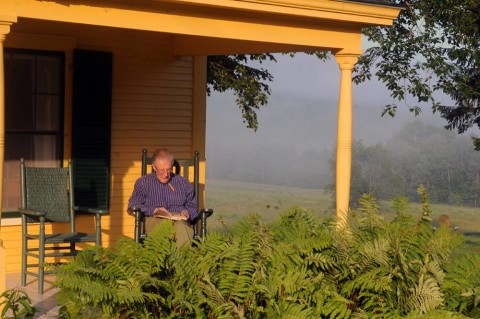
On the first day of class, Michael Armstrong instructed us to write about an object that we each had left back home and that we would miss during the six weeks we were in Vermont. I wrote about how I would miss my grandmother’s ’70 Volkswagen Bug, driving my kids to the pool with the windows rolled down during the hot summer days back in Louisiana. I would miss how the black vinyl smelled as it cooked under the summer sun and intermingled with the smell of gas from the engine.
Professor Armstrong wrote about how he would miss his espresso machine back in England. What he missed wasn’t the machine itself but the chance to have a nice small, strong cup of coffee. As he put it, “a decent cup of coffee.”
I took his class, “Describing the Imagination,” this past summer while working on my master’s at the Bread Loaf School of English. It was one of those classes that students praised for both its structure and its instructor. Armstrong’s premise was that we spend far too much time focusing on the technical aspects of a student’s work—like capitalization and punctuation—and not nearly enough time on his or her creativity and imagination. For each class, a student was required to bring in a piece of original work created by a child for the the whole class to scrutinize and determine what the piece communicated. Every day, one student was assigned the duty of keeping a record of the class which was then compiled in a class journal and kept in the library for every student to read and to make comments.
When it came my turn to record the morning’s activities for the class, I took notes. Later when I went to write them up, I couldn’t stomach the idea of simply laying out the day’s events from beginning to end. So I lied. I wrote the class record as a screenplay, using the class discussion as the basis for the dialogue. The gist of the piece was that we were a roomful of rubes at the feet of The Armstrong, hanging onto his every British word.
That Saturday at a picnic, I saw Michael across a tiny sea of picnic tables. We made eye contact, but I didn’t wave. Nor did he. I wasn’t about to wave. I was unsure how he was going to react to my “creativity,” and I didn’t want to find out over a couple of hot dogs. I tried to keep my eye on him, but he was a wily one. No sooner had I lost visual contact than I spied him waddling towards me. It was too late to move. He was staring right at me, zeroing in on his prey. I feigned surprise to see him.
“I wanted to talk to you about your journal entry,” he said.
His facial expression betrayed nothing. Just the quiet amusement he always exhibited.
Here we go. Just brace yourself and roll with it. Tomorrow’s another day.
“Brilliant,” he added.
I know that brilliance has a different connotation for the Brits than it does for us Yanks and Scalawags, but it felt good to hear the word coming from him. I try to remind myself of this when I’m talking with my students.
On another afternoon toward the end of the summer, I drove 11 miles down Bread Loaf mountain into town. At the Hungry Mind Cafe, I bought an espresso and drove it back up to meet Michael at his cottage along side Hwy. 125. I felt for the man; I was missing my coffee from home too. He was very appreciative. After we talked about my project, we talked about work and education and kids and family and the weather. It reminded me of the few times I hung out with my grandfather on his front porch watching the cars roll down Jefferson Highway as we drank coffee as the sun set.
A couple of months ago, I sent Michael a book as a gift, a simple thank you for teaching me this past summer. But for some reason, it didn’t make it to England. I didn’t do something correctly, so it was returned to the sender. It’s been sitting here on my desk since then. I was going to drop it in the mail in a couple months because I knew exactly where Michael would be this summer. He would be back up on that mountain—sleeping in Bridgman Cottage and teaching in the Barn—just as he had every summer for the past 30 years.
But that won’t happen.
Michael Armstrong died on Monday, March 7, at his home in Southampton, from complications following a recent surgery. He was 81 years old.
I only knew Michael for six weeks of those 81 years. But within that short time, it wasn’t hard to figure out what kind of person he was or where his passion was. He believed that we were all capable of being more than we already are if we could somehow stop with the educating and just start being ourselves. I saw a man who loved what he did and wanted to help others keep on loving what they do. He had one of the sharpest minds I’ve ever encountered, but I when I think of him, I recall his warmth and compassion before his brilliance.
We need more teachers like Michael Armstrong.
I miss him.
(Image of Michael Armstrong is courtesy of the Bread Loaf School English)

I took that class in 2001. He truely loved what he did and imparted that love to his students. It was so easy to sit at the feet of “The Armstrong”!